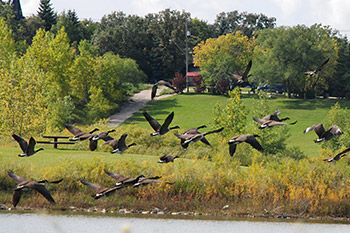 The Emergency Preparedness Team is responsible for coordinating and supporting emergency preparedness and response in the Rural Municipality of East St. Paul. The Team comprised of the Emergency Coordinator, CAO, municipal department managers and volunteers is responsible for overall emergency preparedness activities including training, education, disaster exercises, providing public information, response and mitigation to an emergency incident.
The Emergency Preparedness Team is responsible for coordinating and supporting emergency preparedness and response in the Rural Municipality of East St. Paul. The Team comprised of the Emergency Coordinator, CAO, municipal department managers and volunteers is responsible for overall emergency preparedness activities including training, education, disaster exercises, providing public information, response and mitigation to an emergency incident.
The Emergency Preparedness Team provides advice to Council on all aspects of emergency planning and response to a major emergency incident or disaster. The Emergency Coordinator is responsible for the readiness and operation of the Emergency Operations Center located in the East St. Paul Fire Station. This facility serves as a focal point for coordination, response and mitigation of an emergency incident.
Applicable Documents:
Prepare for...
Be ready for emergencies...
For more information regarding Emergency Preparedness, please contact Dennis Wiwcharyk @ (204) 668-8112 or administration@eaststpaul.com.
Mission Statement
To provide emergency resources to minimize or mitigate the risk of harm to the residents of the Rural Municipality of East St. Paul as a result of an emergency or disaster through emergency planning, training and education.
Prepare for a Disaster
We all have a responsibility to prepare for emergencies. At home, this requires an understanding of everyone's unique needs, supplies to take care of yourself for a period of at least 72 hours, that's 3 days, while emergency workers help those in urgent need. Also required are detailed plans on what you will do if there is an emergency. At work, your emergency planning should include procedures to deal with a disruption, and an understanding of how specific hazards would impact your business.
What are the risks
Overland river flooding is one of East St. Paul's most regular emergency incidents, especially during the spring run-off period. Severe weather is a threat at all times of the year, with the potential for tornadoes, blizzards, windstorms, freezing rain and hail. Besides these natural hazards, there is also the possibility of human-caused emergencies, such as fires, chemical and hazardous materials accidents, infrastructure or utility failures, and transportation accidents. It's important to understand both the probability and severity of the hazards in the place you live. Starting with a basic level of 'all hazard' emergency planning that can be modified to deal with emergencies as they arise, your understanding of hazards will allow for detailed planning to prepare for those that are priority concerns.
